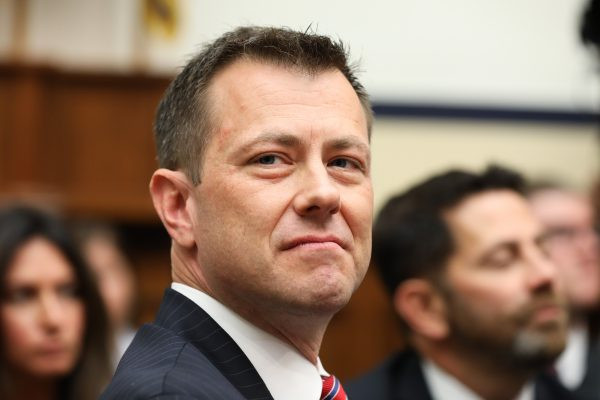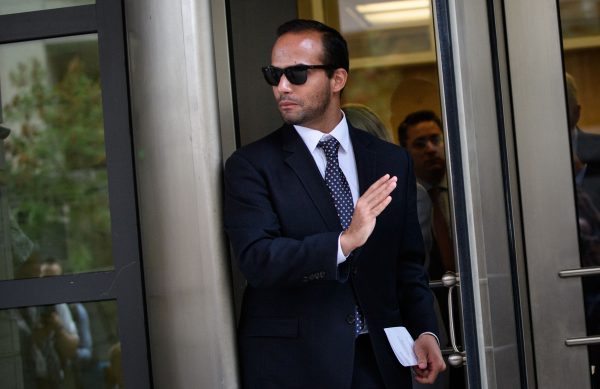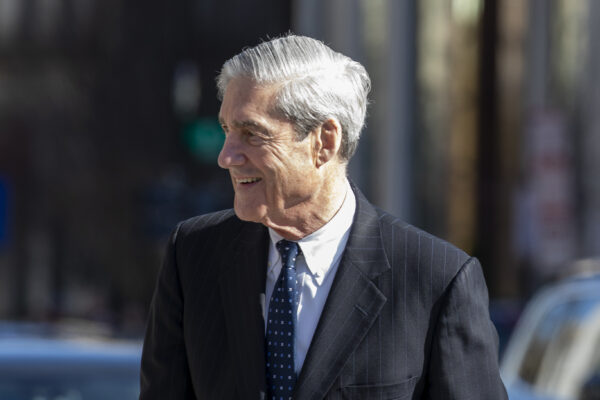
Several FBI agents and United Kingdom intelligence officers were dumbfounded by the decision by FBI higher-ups to launch an investigation of Trump campaign aides for supposed collusion with Russia in 2016.
Early on, UK intelligence officers pointed out that the reason for opening the probe was flimsy and that its continuation would be fruitless. Later on, UK intelligence refused FBI requests for assistance, according to the recently issued final report by Special Counsel John Durham.
The report (pdf) describes candid conversations between FBI agents involved in the investigation as well as the UK agents kept abreast on it.
“Dude, are we telling them [UK intelligence] everything we know, or is there more to this?” asked the FBI agent then-assigned to the U.S. embassy in London in August 2016, shortly after the probe was opened, in an internal message.
“That’s all we have. Not holding anything back,” replied Joe Pientka, identified in the report as the then-supervisory special agent assigned to the investigation.
“Damn that’s thin,” commented the agent at the embassy in the position of Assistant Legal Attaché (ALAT).
“I know. It sucks,” Pientka responded.
The probe’s justification, according to its July 31, 2016, opening document, was that the FBI learned from the Australian government that two of its diplomats had talked to Trump campaign aide George Papadopoulos, who “suggested” that the campaign received “some kind of suggestion” that Russia could help it by anonymously releasing some information that would be damaging to Donald Trump’s opponent, former Secretary of State Hillary Clinton.
Durham noted that the bureau failed to examine in any way the credibility of this information prior to launching the sprawling probe that ensnared Trump and his aides for years to come.
Two days after opening, Pientka and Peter Strzok, then a higher-ranking counterintelligence agent who authored and approved the opening document, met in London with the two Australian diplomats, then-High Commissioner to the UK Alexander Downer and then-political counsellor Erika Thompson.


Durham noted that, according to an FBI report documenting the interview, Papadopoulos made his comments only to Thompson on May 6, 2016, when she was introduced to him. She said that the description of the comments “was written in an intentionally vague way because of what Papadopoulos did and did not say” and that he specifically “did not say he had contact with the Russians,” the Durham report says.
When Durham’s team talked to Downer and Thompson separately in 2019, they significantly corrected the record. They said that Papadopoulos in fact made the comments to both of them on May 10, 2016. Downer recalled “that Papadopoulos simply stated ‘the Russians have information’ and that is all,” according to Durham.
Downer also recalled the Papadopoulos conversation in several media interviews, never mentioning any “suggestion” supposedly made by Papadopoulos about any “suggestion” to the campaign by Russia.


The opening document said that the Papadopoulos information “related to the hacking of the Democratic National Committee’s website/server” in the spring of 2016.
But according to Durham, the FBI had no evidence of any such link. Papadopoulos made no mention of hacking, emails, or the DNC, according to Downer.
When the ALAT briefed UK intelligence on the information, “they expressed real skepticism about the motivations and reliability of Papadopoulos” and “did no assess the information … to be particularly valuable intelligence,” the Durham report says.
“The British could not believe the Papadopoulos bar conversation was all there was,” the ALAT said, explaining that they were convinced the FBI was holding back on them.
One UK intel official “was openly skeptical” and told the ALAT that “the FBI’s plan for an operation made no sense,” the report says.
The official asked why the FBI didn’t simply go ask Papadopoulos; the ALAT agreed with that sentiment, according to the report.
After the FBI ran one of its informants on another Trump campaign aide, Carter Page, in August 2016, the British were again unimpressed, according to the ALAT.
After the UK agents watched a video of the informant talking to Page, one of them told the ALAT: “For [expletive] sake, man. You went through a lot of trouble to get him to say nothing.”


After the investigation was taken over in May 2017 by Special Counsel Robert Mueller, “the Brits finally had enough,” the ALAT said. In response to a request for assistance, a UK intelligence officer “basically said there was no [expletive] way in the hell they were going to do it,” he said.
The ALAT said he was just following orders since the bureau’s upper management was pushing it.
“There was no stopping the train,” he said. “I mean it was … this thing was coming. So my job was to grease the skids for it, and that’s what I did.”
Durham noted that at least some FBI personal involved in the investigation, including Strzok, “demonstrated a rather clear predisposition … to open an investigation of Trump,” pointing to the cursing and demeaning of Trump in text messages by Strzok that he exchanged with his then-mistress Lisa Page, who was then-special counsel to then-FBI Deputy Director Andrew McCabe.
Durham didn’t recommend any new policies for the bureau in his report.
“The promulgation of additional rules and regulations to be learned in yet more training sessions would likely prove to be a fruitless exercise if the FBI’s guiding principles of ‘Fidelity, Bravery, and Integrity’ are not engrained in the hearts and minds of those sworn to meet the FBI’s mission of ‘Protecting the American People and Upholding the Constitution of the United States,’” the report says.
The FBI responded to the report in a statement: “The conduct in 2016 and 2017 that Special Counsel Durham examined was the reason that current FBI leadership already implemented dozens of corrective actions, which have now been in place for some time.
“Had those reforms been in place in 2016, the missteps identified in the report could have been prevented. This report reinforces the importance of ensuring the FBI continues to do its work with the rigor, objectivity, and professionalism the American people deserve and rightly expect,” the bureau said.




Discount Applied Successfully!
Your savings have been added to the cart.